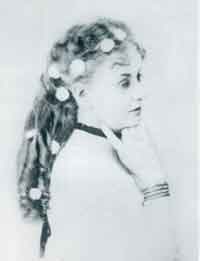|

Elisa Alicia Lynch
(1835-1886)
(South American Pictures, in
Nigel Cawthorne, 2003)
|
Lynch,
Eliza
[bap.
Elizabeth, known as Elisa Alicia] (1835-1886),
courtesan and unofficial first lady of Paraguay, was born on 3
June 1835 in County Cork, the daughter of John Lynch and
Adelaide Schnock. John Lynch was a physician and the family
were from a Church of Ireland background. Little is known of
Eliza Lynch's younger years but she probably received a good
education.
Eliza
Lynch's eldest sister Corinne was living in France in 1847. The
family left Ireland that year and settled in Paris. On 3 June
1850, at the age of fifteen, Eliza Lynch married Jean Louis
Armand de Quatrefages, a French military surgeon. The unhappy
marriage led to a divorce within three years, after a residence
in Algiers. Lynch was living in Paris with her mother, and
perhaps a Russian nobleman, when in 1853 she met Francisco
Solano López (1826-1870) of Paraguay. It was love at first
sight; Solano López was overwhelmed by her beauty and Lynch was
attracted by the security he offered, with his position as heir
to Paraguayan leadership. Shortly thereafter, Lynch became
pregnant. Despite arguments with his younger brother Benigno,
who did not want the affair to be carried on across the ocean,
Solano López left his mistress with the financial resources and
necessary instructions to travel to Paraguay, and departed for
South America.
Eliza Lynch
arrived in Buenos Aires in October 1855 and gave birth to a son,
who was baptised in a private ceremony as Juan Francisco ('Panchito') after her arrival in Asunción, Paraguay, in December.
After an initial bout of depression and culture shock on
encountering Paraguay and its people, Lynch learnt to take
political and financial advantage of her status, despite the
unofficial nature of her position and antipathy on the part of
López family. By 1858 she was a social leader in the community,
despite frequently becoming pregnant and being perceived by the
bigoted local elite – particularly by patrician ladies – to be
living in sin. She had other children with Solano López,
including Corina Adelaida, Enrique Venancio Víctor, Federico
Lloyd, Carlos Honorio, Leopoldo Antonio and Miguel Marcial.
"Madame
Lynch" – as she styled herself, though she was popularly known
as "La Lynch" – was something of a snob and delighted in
displaying her novel habits to the Paraguayans, refusing to ride
sidesaddle and serving elegant French cuisine to guests. She
became a lady to be emulated if not to have affection for, and
her social reputation placed her on an equal footing with some
foreign diplomats, for she did her part to modernise Paraguay.
Thus began a cultural transfer of French, rather than English or
Irish, customs to replace the native ones. She set the tone with
her home and her lover's house, as well as clothing, cuisine,
champagne, cosmetics, sewing machines, de rigeur
music, formal dances, lithographs and other objects d'art.
Although in
her youth Eliza Lynch had been a strikingly handsome woman,
photographs taken around 1860 show her less as a young lady and
more as a dowdy matron. Between 1855 and 1861 she gave birth to
five sons, all of whom publicly bore the López name. She rose
high in the world in a material sense, recipient of gift after
gift from her admiring general. She became the world's largest
female landowner. By 1865 she owned several large ranches and at
least twenty-six urban properties. During Paraguay’s Triple
Alliance War against Argentina, Brazil, and Uruguay, Solano
López transferred vast properties into Lynch’s name perhaps in
order to protect some of his wealth in case he lost the war or
had to abdicate. Solano López ordered the sale to Eliza Lynch of
over 800,000 acres of state lands and forests located in the
Chaco region. In addition, she acquired 12,000,000 acres in
eastern Paraguay and another 9,000,000 acres of yerbales
and forests in the contested area north of the river Apa. All of
Lynch’s landed property was confiscated in 1869.
In 1870
Solano López was killed in Cerro Corá. Eliza Lynch buried her
lover and their son Panchito and fled to Paris with more than
$500,000 in jewels, gold and cash. In 1875 she returned to
Paraguay on the invitation of president Juan B. Gill, who
supported her claims to confiscated property. However, she was
again deported to France and finally settled in Paris where she
died in 1886, in penury and oblivion.
In the
1970s, under the influence of nationalist and revisionist
historians, Eliza Lynch was proclaimed a Paraguayan national
heroine and her remains were removed from a grave in Paris to
her adopted country in South America. A central street in
Asunción was named 'Madame Lynch' in her honour. The life of
Eliza Lynch has fascinated modern writers of fiction and
biography in English and Spanish. In 2003 two biographies by
Nigel Cawthorne and Siân Rees, listed below, were published
concurrently, with the same number of pages and
identical opening scenes.
Edmundo
Murray
References
-
Barrett,
William, Una Amazona (Asunción: Servilibro, 2003).
- Baptista,
Francisco, Elysa Lynch, mujer de mundo y de guerra
(Buenos Aires: Emecé, 1987).
- Cawthorne,
Nigel, The Empress of South America (London: Heinemann,
2003).
- O'Leary,
Juan E., El Mariscal Solano López (Asunción, 1920).
- Rees, Siân,
The Shadows of Elisa Lynch: How a Nineteenth-Century Irish
Courtesan Became the Most Powerful Woman in Paraguay
(London: Review, 2003).
- Williams,
John Hoyt, The Rise and Fall of the Paraguayan Republic,
1800-1870 (Austin: University of Texas at Austin, Institute
of Latin American Studies, 1979). Latin American Monographs, N°
48.
See also
Eliza Lynch (1835-1886): A Bibliography. [document]
|


